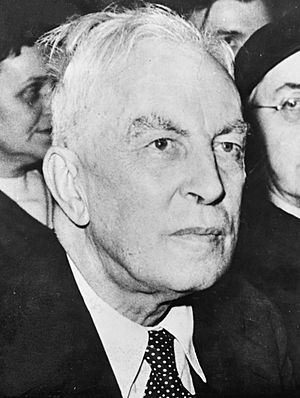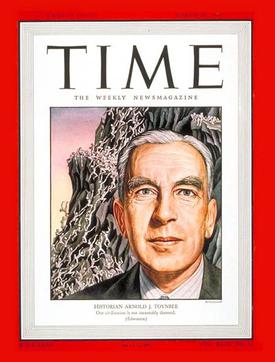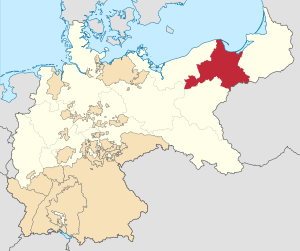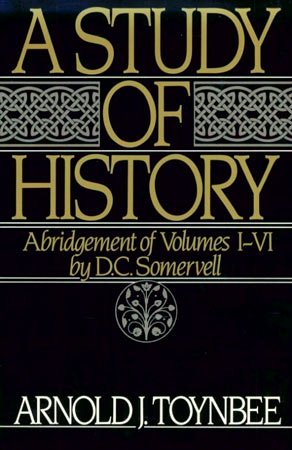Arnold J. Toynbee facts for kids
Quick facts for kids
Arnold J. Toynbee
|
|
|---|---|
 |
|
| Born |
Arnold Joseph Toynbee
14 April 1889 London, England
|
| Died | 22 October 1975 (aged 86) York, England
|
| Alma mater | Balliol College, Oxford |
|
Notable work
|
A Study of History |
| Spouse(s) |
|
| Children |
|
| Relatives |
|
| Scientific career | |
| Institutions | |
| Influences |
|
| Influenced |
|
Arnold Joseph Toynbee (born April 14, 1889 – died October 22, 1975) was a famous English historian and writer. He was a professor who studied how different countries and cultures interact. From 1918 to 1950, many people saw him as a top expert in world affairs. He also led studies at Chatham House from 1924 to 1954, where he helped create many books about international events.
He is most famous for his 12-book series called A Study of History (published between 1934 and 1961). Toynbee wrote many papers, articles, and books that were translated into different languages. Because of this, he was a very popular and talked-about scholar in the 1940s and 1950s.
Contents
Biography: A Life of Learning and History
Arnold Toynbee was born in London, England, on April 14, 1889. His father, Harry Valpy Toynbee, was a secretary for a charity. His mother was Sarah Edith Marshall. Arnold's sister, Jocelyn Toynbee, became a well-known archaeologist and art historian. His family had many important thinkers, including his uncle, the economist Arnold Toynbee.
Young Arnold was very smart. He earned scholarships to attend Winchester College and then Balliol College, Oxford, where he studied ancient history. He also spent some time studying at the British School at Athens. This experience helped shape his ideas about why civilizations rise and fall.
In 1912, he started teaching ancient history at Balliol College. During World War I, in 1915, he began working for the British government's intelligence department. After the war, he was a delegate at the Paris Peace Conference in 1919. He then became a professor at the University of London, teaching about the Byzantine and modern Greek history.
He later became a research professor of international history at the London School of Economics in 1925. At the same time, he became the director of studies at the Royal Institute of International Affairs in London. In 1937, he was chosen as a Fellow of the British Academy, which is a high honor for scholars in the humanities and social sciences in the UK.
Toynbee married Rosalind Murray in 1913, and they had three sons, including Philip Toynbee. They divorced in 1946, and he then married Veronica M. Boulter. Arnold Joseph Toynbee passed away on October 22, 1975, at the age of 86.
Ideas on Peace After World War I

After World War I, Arnold Toynbee had strong ideas about how to create lasting peace. In his 1915 book, Nationality & the War, he suggested that new country borders should be based on the idea of "nationality". This means people should live in a country that matches their shared culture and language.
He also criticized the idea of "natural borders," which some countries used to justify expanding their land. Toynbee argued that this idea could lead to more wars. Instead, he believed countries should focus on free trade, working together, and cooperating. He thought this would make countries less likely to want to expand their territories.
Toynbee also supported the idea of "national self-determination." This means that the people living in a certain area should get to decide which country they want to be a part of. This idea was sometimes used after World War I through special votes called plebiscites in several regions.
Global Impact and A Study of History

Toynbee's major work, A Study of History, was very popular both in universities and with the general public. In the United States, over 7,000 copies of the full ten-volume set were sold by 1955. Many people, including scholars, read the shorter, one-volume version by D. C. Somervell, which sold over 300,000 copies.
His work was widely discussed in newspapers and magazines. Toynbee himself gave many talks and presentations. He even appeared on the cover of Time magazine in 1947. The article called his work "the most thought-provoking historical theory written in England since Karl Marx's Capital." He also often spoke on the BBC, discussing history and world events.
Some historians, like Ernst Robert Curtius, saw Toynbee's ideas as a new way to understand history after World War II. Curtius wrote that Toynbee tried to answer how cultures and societies "arise, grow and decay" by comparing them.
However, after the 1960s, Toynbee's ideas became less popular in universities and the media. Some historians felt he focused too much on myths and religion instead of just facts. They also thought his conclusions were more like those of a religious moralist than a historian. Despite this, some classical historians still refer to his work because of his strong background in ancient history.
Political Influence and World Views
Toynbee worked for the British government's Foreign Office during World War I and was involved in the peace conference afterward. He also led studies at Chatham House, which helped the British Foreign Office with research, especially during World War II.
Meeting with Adolf Hitler
In 1936, Toynbee visited Berlin and met privately with Adolf Hitler. Hitler told Toynbee that he only wanted to unite German-speaking people and wished for Britain's understanding and cooperation. Toynbee believed Hitler was sincere and shared this message with British leaders.
Toynbee gave a lecture in English, which was well-received in Berlin. However, some of his colleagues back home were worried about his attempts to improve relations with Nazi Germany.
Views on Russia and the Cold War
Toynbee was concerned by the Russian Revolution because he saw Russia as different from Western societies. Later, in 1952, he suggested that the Soviet Union had been a victim of Western actions. He viewed the Cold War as a conflict between different beliefs, where the Soviet Union's ideas were a challenge to the West's Christian heritage.
Greece and the Middle East
Toynbee was an important expert on the Middle East. At first, he supported Greece and was against Turkey during World War I. This led to him getting a teaching position at King's College London. However, after the war, he changed his mind and became more supportive of Turkey. He accused the Greek military government of terrible acts in Turkish areas. This made the wealthy Greeks who funded his teaching position angry, and he had to resign in 1924.
His views on the Middle East also changed regarding Zionism (the movement to create a Jewish state). In 1917, he supported Jewish political rights in Palestine. But by the 1920s, after meeting with Arab leaders, his views shifted. By the late 1940s, he was known as a supporter of the Arab cause.
In the 1950s, Toynbee continued to oppose the creation of a Jewish state, partly because he feared it could lead to nuclear war. However, after a debate in 1961 with Yaakov Herzog, the Israeli ambassador to Canada, Toynbee softened his stance. He urged Israel to help prevent nuclear war. He also debated with historian Solomon Zeitlin about Jewish claims to Palestine, arguing that the human rights of the Arab population to their homes were more important. He did agree that Jews had a claim to a national home in Palestine, but only if it didn't harm the rights of the Arab people already living there.
Dialogue with Daisaku Ikeda
In 1972, Toynbee met with Daisaku Ikeda, the leader of Soka Gakkai International (SGI), a Buddhist organization. They discussed many important global issues, including the dangers of nuclear weapons. Toynbee believed that the atomic bomb had made warfare incredibly dangerous, threatening humanity's existence. He worried that people might not become ethical enough to avoid destroying themselves.
They met several times in London, talking for many hours. Their discussions and letters were published in a book called Choose Life, which has been translated into 24 languages. Toynbee also wrote the introduction for Ikeda's famous book, The Human Revolution.
Some people criticized Toynbee for being paid for these interviews. His granddaughter, Polly Toynbee, wrote an article in 1984 saying that Choose Life was "probably the book among his works most kindly left forgotten." However, an exhibition celebrating their meetings was held in SGI centers worldwide in 2005, showing their discussions and letters.
Toynbee Prize Foundation
The Toynbee Prize is a special award given to social scientists. It recognizes people who have made important academic and public contributions to humanity. Today, it is awarded every two years for work that significantly helps the study of global history.
See also
 In Spanish: Arnold J. Toynbee para niños
In Spanish: Arnold J. Toynbee para niños
- Toynbee tiles
- Fernand Braudel
- Christopher Dawson
- Will Durant
- Carroll Quigley
- Oswald Spengler
- Eric Voegelin
- World history
Images for kids




